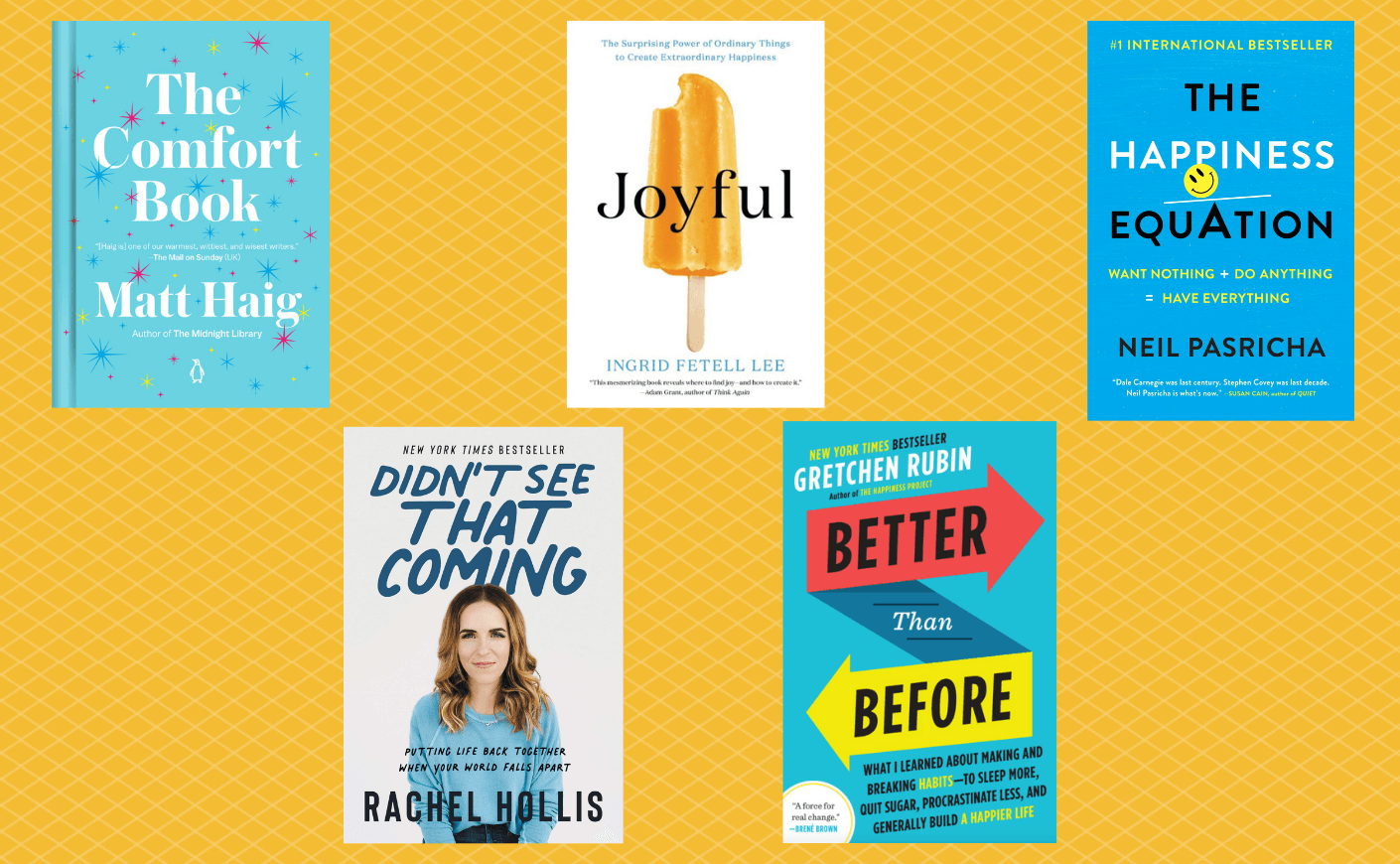Like most people, when asked what I want for my four kids (and, really, for myself), I respond, “To just be happy.” But what does that even mean? And is that actually a worthy goal?
Happiness is often elusive. Some days, it visits us in the form of a cozy coffee with an old friend, while other days, it dangles itself in front of us, the string on a balloon that dances against the ceiling and can’t be caught. Maybe we’re too focused on it. Maybe — especially during periods of grief, tragedy, or, say, a global pandemic — it’s too tough to strive for. (Is feeling just so-so an option?)
Many brilliant authors have wrestled with the happiness conundrum: Here are a few of my favorite books that provide a roadmap to achieving happiness, or something close to it. I hope that knowing these resources exist makes you a bit happier today. And if you’re craving additional inspiration, listen to my podcast, Moms Don’t Have Time to Read Books, where I talk to these authors, and more.
The Best Books About Happiness
Matt Haig, The Comfort Book
You might’ve read The Midnight Library, the #1 bestseller by Matt Haig. But you probably didn’t know that Matt himself has experienced horrific depression and anxiety. To get through it, Matt would write on little scraps of paper: thoughts, research, quotes, studies, examples, even recipes. He finally compiled all those notes into a collection of empowering, beautiful concepts that’ll help anyone get through tough times. I read and reread sections of The Comfort Book, and particularly loved this quote: “You are waterproof. It is easier to learn to be soaked and happy than to learn how to stop the rain.” (Listen to our podcast here.)
Helen Russell, How to Be Sad: Everything I’ve Learned About Getting Happier by Being Sad (U.S. pub day: 10/5/21)
British journalist Helen Russell lost her sister to SIDS as a young girl. The tragedy splintered her family: Her dad left, her mom started dating, and no one helped Helen process what happened. Perhaps as an outgrowth of that trauma, Helen turned to the literature on happiness — and sadness — to see what benefits might be gained from allowing yourself to feel grief and pain. (Spoiler: There are a lot — even the cortisol release from crying helps calm the body.) Helen interweaves her own personal family tale with an abundance of research on joy and gloom. Realizing that sadness has a purpose certainly makes me feel better.
Gretchen Rubin, The Happiness Project: Or, Why I Spent a Year Trying to Sing in the Morning, Clean My Closets, Fight Right, Read Aristotle, and Generally Have More Fun
Gretchen Rubin has become something of a happiness guru. As an Upper East Side lawyer and mother, Gretchen realized that while everything in her life was “fine,” nothing was great — she’d snap at her husband, didn’t enjoy time with her kids, and just generally wasn’t as happy as she thought she should, given the objectively great state of her life. So she undertook an experiment: Armed with the science behind what boosts happiness, Gretchen learned how certain habits were the secret to mood-based success. Aside from this #1 New York Times bestseller, she has plenty of other thought-provoking books that’d be ideal for your to-be-read pile, including: Happier at Home; Better Than Before; and The Four Tendencies. She also has a podcast, Happier with Gretchen Rubin, video courses, and an app, Better. Apparently I’m her part-time publicist? (Listen to our podcast here.)
Neil Pasricha, The Happiness Equation: Want Nothing + Do Anything = Have Everything
Toronto-based, Harvard Business School-educated happiness guru Neil Pasricha has written seven books that’ve sold millions of copies in total. That’s how badly we all want to be happy. Neil wrote The Happiness Equation as a letter to his unborn son. In general, Neil has a knack for tackling happiness via an analytic framework that takes the emotional edge off the emotion itself. Plus, if you “read” the book in audio form, he’s a ton of fun to listen to. Neil also compiled tons of reasons to be happy — just in case you need a reminder — called The Book of Awesome, and has a great children’s book called Awesome Is Everywhere. (Listen to our podcast here.)
Ingrid Fetell Lee, Joyful: The Surprising Power of Ordinary Things to Create Extraordinary Happiness
What if your nail polish could actually cure the blues? Ingrid Fetell Lee, founder of the Aesthetics of Joy movement, knows that happiness doesn’t come only from deep meditation, yoga, or self-reflection — sometimes a bright-yellow manicure can do the trick. Ingrid, a self-proclaimed “joyspotter,” explains through psychology and neuroscience why confetti, bursts of color, and surprising visual elements can change your headspace. So instead of making a radical change, you could try changing the arrangement of your desk, or adding a hula girl to your car’s dashboard. Ingrid’s specific, actionable steps are helpful, easy, and truly transformative. (Listen to our podcast here.)
Jen Sincero, Bad-Ass Habits: Cultivate the Awareness, Boundaries, and Daily Upgrades You Need to Make Them Stick
Habits make happiness, and here, author Jen Sincero tells us why specific ones can truly change our lives. This book’s a companion to her Bad-Ass suite of books and products, and includes a 21-day guide to changing our own habits to create lifelong happiness. (Listen to our podcast here.)
Rachel Hollis, Didn’t See That Coming: Putting Life Back Together When Your World Falls Apart
The bestselling author tackles how to live when life throws wrenches, or even anvils, in your path. Here, Rachel shares the experiences that threw her for a loop, and gives motivating, funny, real-deal tips on getting through dark days and emerging into a happier place. (Listen to our podcast here.)
See? Don’t you feel just a little bit better?
Zibby Owens is an author, podcaster, and publisher












